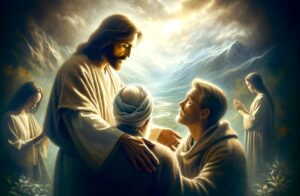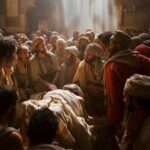John Chapter 5:1-47 King James Bible KJV

Healing At the Pool of Bethesda, The Sabbath Controversy, Jesus’ Unity With The Father, The Testimonies About Jesus
John Chapter 5:1-47 King James Bible KJV. John Chapter 5 highlights Jesus’ divine authority to heal, give life, and judge, presenting Him as the unique Son of God. It calls for faith in Jesus as the pathway to eternal life and warns of the judgment that awaits those who reject Him. The chapter begins with Jesus healing a man on the Sabbath, which sparks a controversy with the Jewish leaders. This leads to Jesus explaining His unique relationship with God and His role in giving eternal life and executing judgment.
- Jesus’ Divine Authority: Central to this chapter is Jesus’ claim to be the Son of God, who shares in the Father’s work and authority. He heals, gives life, and executes judgment—all powers that belong to God alone. This chapter emphasizes that Jesus is not just a prophet or teacher; He is God’s divine Son, with the authority to bring eternal life and judge humanity.
- Eternal Life through Jesus: Jesus declares that those who believe in Him have already passed from death to life. Eternal life is not just a future hope but a present reality for believers. Through faith in Jesus, people are saved from judgment and given new life.
- Judgment and Resurrection: Jesus teaches that there will be a resurrection for all people: those who believe in Him will rise to eternal life, and those who reject Him will face judgment. This underscores the importance of faith in Jesus for salvation.
- Rejection of Legalism: The controversy surrounding Jesus’ healing on the Sabbath highlights the danger of legalism—strict adherence to religious rules without understanding the heart of God’s intentions. Jesus demonstrates that love, mercy, and restoration are at the core of God’s work, even on the Sabbath.
- Witness and Testimony: Jesus’ divine identity is supported by multiple testimonies, including His works and the Scriptures. However, the chapter also shows that human pride and spiritual blindness can prevent people from seeing the truth, as seen in the rejection by the religious leaders.
John Chapter 5:1-47 King James Bible KJV
—————-
Healing at the Pool of Bethesda – verses 1-15
Jesus visits a pool in Jerusalem called Bethesda, where many sick people would gather, hoping to be healed when the waters were stirred. Jesus encounters a man who had been an invalid for 38 years. Jesus asks him if he wants to be healed, and then commands him to “Get up, pick up your mat, and walk.” The man is instantly healed.

The Sabbath Controversy (9-10) – The healing occurs on the Sabbath, and the Jewish leaders become upset, not because of the healing itself, but because the man was carrying his mat (which they considered a violation of the Sabbath law). When the man tells them it was Jesus who healed him, this sparks further conflict with the leaders.
KEY THEMES:
Healing and Restoration: The healing of the invalid man symbolizes Jesus’ power to restore and bring life. This miracle, like others, points to His divine authority.
Jesus’ Authority over the Sabbath: The religious leaders saw the Sabbath as a day where work was strictly prohibited. However, Jesus demonstrates that the true purpose of the Sabbath is for rest and restoration, and His authority supersedes legalistic interpretations of the law.
Spiritual Healing: The man’s healing is also a metaphor for spiritual healing. Later, Jesus warns him, “Stop sinning, or something worse may happen to you” (John 5:14), implying that the healing of the soul (from sin) is even more important than physical healing.


Jesus’ Defense of His Authority – verses 16-30
When confronted by the Jewish leaders about healing on the Sabbath, Jesus responds by claiming that He is doing the work of His Father. He explains that God the Father is always working, even on the Sabbath, and thus, as the Son of God, He continues His Father’s work. This bold claim further angers the Jewish leaders because Jesus is not only breaking the Sabbath but also claiming equality with God.
Jesus’ Unity with the Father (19-23)
- Jesus asserts that He does nothing on His own but only what He sees the Father doing. He emphasizes the unity between Himself and the Father, saying, “The Son can do nothing by Himself; He can do only what He sees His Father doing.”
- He also claims that the Father has given Him the authority to give life and to execute judgment. By honoring the Son, people are honoring the Father, indicating that Jesus is the divine Son of God, with equal authority to the Father.
Eternal Life and Judgment (24-30)
- Jesus proclaims that whoever hears His word and believes in the One who sent Him has eternal life and will not be judged, but has passed from death to life.
- He speaks of a future time when the dead will hear His voice and rise—those who have done good to a resurrection of life and those who have done evil to a resurrection of judgment.
KEY THEMES:
Divine Authority: Jesus explains that His authority is directly from God the Father, and they are united in their work. His authority extends to giving life and executing judgment.
Eternal Life through Faith: Jesus teaches that eternal life is a present reality for those who believe in Him. By believing in Jesus, people pass from spiritual death to eternal life.
Resurrection and Judgment: Jesus holds the authority over life and death. He speaks of two future resurrections: one to eternal life and one to judgment.

The Testimonies about Jesus – verses 31-47
Jesus provides further evidence of His divine mission by pointing to multiple testimonies that confirm who He is. He explains that if He testifies about Himself, His testimony would not be valid according to Jewish law (which required two or three witnesses). However, there are other witnesses to His identity:
- John the Baptist: John the Baptist testified that Jesus is the Lamb of God who takes away the sins of the world.
- Jesus’ Works: The miracles and works that Jesus performs bear witness to His divine authority and that He is sent by the Father.
- God the Father: Jesus claims that God the Father has also testified about Him, though the Jewish leaders have not accepted or understood this testimony.
- The Scriptures: Jesus asserts that the Jewish Scriptures (the Old Testament) testify about Him. However, the Jewish leaders, who study the Scriptures, fail to recognize Him as the fulfillment of the prophecies and promises.
KEY THEMES:
Witness and Testimony: Jesus’ identity as the Son of God is confirmed by multiple witnesses: John the Baptist, His miracles, God the Father, and the Scriptures. This affirms that Jesus is not acting on His own but is fulfilling God’s plan.
The Rejection of Jesus: Despite the ample testimony, the Jewish leaders reject Jesus because they are focused on their own understanding of the law and tradition. Jesus points out that if they truly believed Moses (who wrote the Law), they would believe in Him because Moses wrote about Him.
John Chapter 5:1-47 King James Bible KJV
1 After this there was a feast of the Jews; and Jesus went up to Jerusalem.
2 Now there is at Jerusalem by the sheep market a pool, which is called in the Hebrew tongue Bethesda, having five porches.
3 In these lay a great multitude of impotent folk, of blind, halt, withered, waiting for the moving of the water.
4 For an angel went down at a certain season into the pool, and troubled the water: whosoever then first after the troubling of the water stepped in was made whole of whatsoever disease he had.
5 And a certain man was there, which had an infirmity thirty and eight years.
6 When Jesus saw him lie, and knew that he had been now a long time in that case, he saith unto him, Wilt thou be made whole?
7 The impotent man answered him, Sir, I have no man, when the water is troubled, to put me into thepool: but while I am coming, another steppeth down before me.
8 Jesus saith unto him, Rise, take up thy bed, and walk.
9 And immediately the man was made whole, and took up his bed, and walked: and on the same day was the sabbath.
10 The Jews therefore said unto him that was cured, It is the sabbath day: it is not lawful for thee to carry thy bed.
11 He answered them, He that made me whole, the same said unto me, Take up thy bed, and walk.
12 Then asked they him, What man is that which said unto thee, Take up thy bed, and walk?
13 And he that was healed wist not who it was: for Jesus had conveyed himself away, a multitude being in that place.
14 Afterward Jesus findeth him in the temple, and said unto him, Behold, thou art made whole: sin no more, lest a worse thing come unto thee.
15 The man departed, and told the Jews that it was Jesus, which had made him whole.

16 And therefore did the Jews persecute Jesus, and sought to slay him, because he had done these things on the sabbath day.
17 But Jesus answered them, My Father worketh hitherto, and I work.
18 Therefore the Jews sought the more to kill him, because he not only had broken the sabbath, but said also that God was his Father, making himself equal with God.
19 Then answered Jesus and said unto them, Verily, verily, I say unto you, The Son can do nothing of himself, but what he seeth the Father do: for what things soever he doeth, these also doeth the Son likewise.
20 For the Father loveth the Son, and sheweth him all things that himself doeth: and he will shew him greater works than these, that ye may marvel.
21 For as the Father raiseth up the dead, and quickeneth them; even so the Son quickeneth whom he will.
22 For the Father judgeth no man, but hath committed all judgment unto the Son:
23 That all men should honour the Son, even as they honour the Father. He that honoureth not the Son honoureth not the Father which hath sent him.
24 Verily, verily, I say unto you, He that heareth my word, and believeth on him that sent me, hath everlasting life, and shall not come into condemnation; but is passed from death unto life.
25 Verily, verily, I say unto you, The hour is coming, and now is, when the dead shall hear the voice of the Son of God: and they that hear shall live.
26 For as the Father hath life in himself; so hath he given to the Son to have life in himself;
27 And hath given him authority to execute judgment also, because he is the Son of man.
28 Marvel not at this: for the hour is coming, in the which all that are in the graves shall hear his voice,
29 And shall come forth; they that have done good, unto the resurrection of life; and they that have done evil, unto the resurrection of damnation.
30 I can of mine own self do nothing: as I hear, I judge: and my judgment is just; because I seek not mine own will, but the will of the Father which hath sent me.

31 If I bear witness of myself, my witness is not true.
32 There is another that beareth witness of me; and I know that the witness which he witnesseth of me is true.
33 Ye sent unto John, and he bare witness unto the truth.
34 But I receive not testimony from man: but these things I say, that ye might be saved.
35 He was a burning and a shining light: and ye were willing for a season to rejoice in his light.
36 But I have greater witness than that of John: for the works which the Father hath given me to finish, the same works that I do, bear witness of me, that the Father hath sent me.
37 And the Father himself, which hath sent me, hath borne witness of me. Ye have neither heard his voice at any time, nor seen his shape.
38 And ye have not his word abiding in you: for whom he hath sent, him ye believe not.
39 Search the scriptures; for in them ye think ye have eternal life: and they are they which testify of me.
40 And ye will not come to me, that ye might have life.
41 I receive not honour from men.
42 But I know you, that ye have not the love of God in you.
43 I am come in my Father’s name, and ye receive me not: if another shall come in his own name, him ye will receive.
44 How can ye believe, which receive honour one of another, and seek not the honour that cometh from God only?
45 Do not think that I will accuse you to the Father: there is one that accuseth you, even Moses, in whom ye trust.
46 For had ye believed Moses, ye would have believed me: for he wrote of me.
47 But if ye believe not his writings, how shall ye believe my words?
You must be logged in to post a comment.